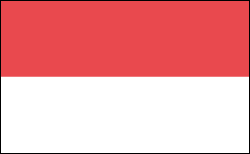Indonesia's Election
Updated February 21, 2017 | Factmonster Staff 

Factsheet: Indonesia's Election
June 7th, 1999
 This article was posted on June 4, 1999.
This article was posted on June 4, 1999.On the eve of Indonesia's first free parliamentary election since 1955, 48 political parties are jockeying for position (another 93 failed to make the cut). The June 7th election will elect 462 members of Parliament, a large part of the 700-seat assembly that will select the next President and Vice President on November 10.
No party is expected to win a majority, including Golkar, the ruling party of President B. J. Habibie and former President Suharto. Habibie has made significant reforms unimaginable under Suharto's rule—a free press flourishes, political prisoners have been released, East Timor has been offered the opportunity to secede, and truly democratic elections are in progress—but his association with Suharto has indelibly tainted him.
No party is expected to win a majority, including Golkar, the ruling party of President B. J. Habibie and former President Suharto. Habibie has made significant reforms unimaginable under Suharto's rule—a free press flourishes, political prisoners have been released, East Timor has been offered the opportunity to secede, and truly democratic elections are in progress—but his association with Suharto has indelibly tainted him.
The three other major parties in the election have signed a coalition pact to guarantee Habibie's ouster:
- Partai Demokrasi Indonesia-Perjuangan (Indonesian Democracy Party-Struggle, PDI-P), led by Megawati Sukarnoputri, is probably the strongest party. Megawati is the daughter of Sukarno, Indonesia's first president, and had been the head of the PDI in 1994 until Suharto had her removed.
This had the effect of making her a political martyr, and she formed a new PDI, adding "Struggle" to its title, emphasizing her attempts to surmount the old regime. (There is still an old PDI, but it has little power.) Among her struggles are the numerous Islamic groups who have objected to a woman leading the government. - Partai Amanat Nasional (National Mandate Party, PAN) is led by Amien Rais. One of the first leaders to call for Suharto's resignation, he was the leader of a 28-million-member Islamic social association before entering politics. His platform, however, is pluralistic and liberal, and he advocates a secular rather than an Islamic state.
- Partai Kebangkitan Bangsa (National Awakening Party, PKB) is led by Abdurrahman Wahid, who is also the leader of the nation's largest Muslim social organization. Like Rais, he believes in a secular state and is also pluralistic—he supports the Chinese minority, for example, which is rare among Muslim leaders. Poor health may limit his candidacy, however.
In one sense the election is an exhilarating example of the democractic process at work — for the first time silenced groups are participating openly in Indonesian politics, and for once, the results of the election are not staged and are genuinely unpredictable.
At the same time, however, the fragmentation and factionalism of these flegling political parties may create a government ineffective and lacking direction, which is particularly dangerous in a country fraught with economic catastrophe and rife with ethnic violence and secessionism.
At the same time, however, the fragmentation and factionalism of these flegling political parties may create a government ineffective and lacking direction, which is particularly dangerous in a country fraught with economic catastrophe and rife with ethnic violence and secessionism.
